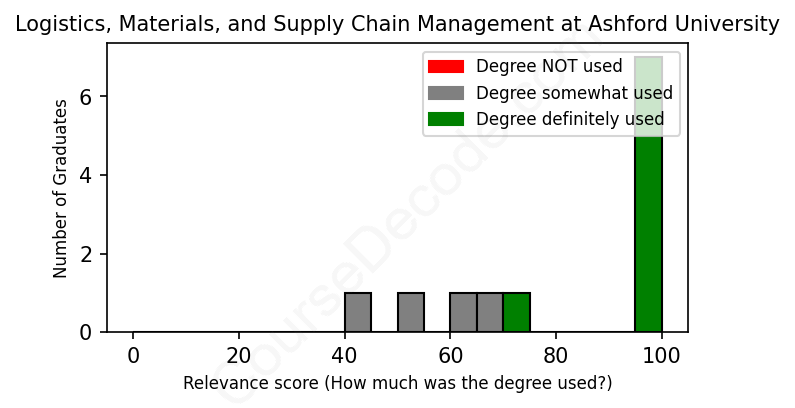
First, some facts. Of the Logistics, Materials, and Supply Chain Management graduates from Ashford University we've analyzed , here's how many have used (or NOT used) their degree in their career:

These are estimates based on AI analysis of 12 LinkedIn profiles (see below).
The verdict? Significantly above average. Overall, with an average relevance score of 82%, Logistics, Materials, and Supply Chain Management graduates from Ashford University have a much higher likelihood (+15%) of finding work in this field compared to the average graduate across all fields:
And for comparison, here's the chart for all profiles we've looked at across all degrees.
Also, after graduating, only 25% of these graduates have pursued further education other than another Bachelor's degree (such as a Masters degree or other), compared to the average across all profiles of 35%. This suggests a Bachelors degree is enough for most Logistics, Materials, and Supply Chain Management graduates, and it's normal to look for work straight after graduation.
See the details:
|
Relevance score: 60% We think this person has gone into a career only somewhat relevant to their degree. We think this person has gone into a career only somewhat relevant to their degree.
DEGREE INFOGraduated in 2016 from Ashford University with a Bachelor of Arts - BA in Logistics, Materials, and Supply Chain Management. No other secondary education since. JOB HISTORY SINCE GRADUATIONS4 NCOIC U.S. Army Quartermaster Corps May 2016 - Present Principal Specialist- Property  Raytheon Technologies Jun 2022 - Present ABOUTAccomplished in developing effective processes and directing complex logistics functions for projects. Excel at coordinating tasks of numerous internal divisions and external agencies to ensure rapid, accurate delivery of equipment, materials, and resources. Advanced expertise in reviewing invoices and shipping manifests to ensure full compliance with local customs and international regulations. Track record of identifying redundancies and maximizing resources to streamline operations. Proficient in a variety of logistics and supply management software, both proprietary and commercial. Currently serving in the United States Army with 19+ years of active duty. |
The top 10 most common jobs done by the graduates we've analyzed (ranked most common to least) are:
Looking at the careers of people who graduated with a degree in Logistics, Materials, and Supply Chain Management from Ashford University, it's pretty clear that many have taken paths deeply rooted in logistics and supply chain roles. Positions like Operations NCOs in the Army, Subcontract Managers at major companies, and logistics-focused roles at corporations show that a significant number of graduates apply their knowledge and skills directly in relevant fields. These jobs typically require strong analytical skills, organization, and an understanding of how to efficiently manage materials and resources, which aligns well with what they learned during their studies.
However, not all graduates have secured jobs that closely relate to their degree. Some have ventured into roles like property management, security positions, or even ownership of construction firms where logistics knowledge isn’t a daily focus. In these cases, while they may use some logistical skills occasionally, the core responsibilities often steer away from logistics and supply chain management concepts. Overall, though, it seems that a good portion of graduates are finding fulfilling roles that leverage their education effectively, while a smaller percentage are exploring different career avenues that don't directly tap into their degree's core competencies.
Here is a visual representation of the most common words in job titles for Logistics, Materials, and Supply Chain Management graduates (this is across all Logistics, Materials, and Supply Chain Management graduates we've analyzed, not just those who went to Ashford University):

Looking at the career trajectories of graduates from Ashford University who studied Logistics, Materials, and Supply Chain Management, it seems like they often start off in solid entry-level roles that relate to their field. Many of the graduates took positions in the military or as managers within logistics firms shortly after graduating. For instance, some worked in roles like training NCOs or property managers right out of school, which indicates that they were able to find jobs that utilize their skills and knowledge right away. As they gained more experience, it appears that many of them advanced to managerial or specialist positions within a few years, suggesting a strong upward trajectory in their careers.
Fast-forward about 5 to 10 years after graduation, and you can see a lot of these alumni have climbed the ranks to significant roles in reputable companies or are even running their own businesses. Positions like Global Logistics Manager and Sr. Supply Chain Specialist pop up frequently, showing that a good number of graduates remain in logistics-related fields and continue to excel. There are also some interesting career shifts, like moving into talent acquisition or project management, but overall, it seems like the majority have managed to find fulfilling careers in areas related to their degrees. So, if you're considering this path, there's a pretty good chance that it could lead to a successful career in logistics and supply chain management!
Honestly, pursuing a Bachelor’s degree in Logistics, Materials, and Supply Chain Management is typically on the easier side compared to more technical majors. At Ashford University or similar institutions, the courses might cover topics like inventory management, transportation, and basic economics, which can be pretty straightforward if you put in the effort. The workload is manageable, especially if you stay organized and keep up with your readings and assignments. Plus, since logistics is about real-world applications, many find the material interesting and relatable, which makes it less daunting. Just like any degree, it gets tougher when you let things pile up, so staying on top of your work will definitely help keep it easier!
Most commonly, in the LinkedIn profiles we've looked at, it takes people 4 years to finish a Bachelor degree in Logistics, Materials, and Supply Chain Management.
Looking at these graduates from Ashford University, it seems like many of them have found solid positions in logistics and supply chain management, which is pretty awesome! Generally, they’re climbing the job ladder, especially those who started in roles like subcontracts administration and made their way to managerial positions. The graduates from 2013 and 2016 especially seem to have established some steady careers in the Army and in project management roles, which usually come with decent pay. On the flip side, some of the 2018 grads, like those in security roles, might not be pulling in as much initially, but it looks like they’re stepping up with better opportunities soon. Overall, it appears they’re doing well for themselves, and with experience, they’re likely to see their earnings increase over time!
Here is a visual representation of the most common words seen in the "about" section of LinkedIn profiles who have a Bachelor degree in Logistics, Materials, and Supply Chain Management (this is across all Logistics, Materials, and Supply Chain Management graduates we've analyzed, not just those who went to Ashford University). This may or may not be useful:

Here are all colleges offering a Bachelor degree in Logistics, Materials, and Supply Chain Management (ordered by the average relevance score of their Logistics, Materials, and Supply Chain Management graduates, best to worst) where we have analyzed at least 10 of their graduates:
| College | Score | Count |
|---|---|---|
 Michigan State University Michigan State University
|
84 | 23 |
 Auburn University Auburn University
|
83 | 19 |
 Ashford University Ashford University
|
82 | 12 |
 University of Wisconsin-Milwaukee University of Wisconsin-Milwaukee
|
81 | 10 |
 Rutgers Business School Rutgers Business School
|
79 | 24 |
 Penn State University Penn State University
|
78 | 21 |
 Embry-Riddle Aeronautical University Embry-Riddle Aeronautical University
|
78 | 10 |
 Arizona State University - W. P. Carey School of Business Arizona State University - W. P. Carey School of Business
|
78 | 14 |
 Iowa State University Iowa State University
|
77 | 14 |
 University of Houston University of Houston
|
76 | 30 |
 University of Arkansas University of Arkansas
|
76 | 18 |
 University of Tennessee, Knoxville University of Tennessee, Knoxville
|
75 | 15 |
 University of North Texas University of North Texas
|
69 | 14 |
 Texas A&M University Texas A&M University
|
67 | 27 |
 Georgia Southern University Georgia Southern University
|
62 | 13 |
 The Ohio State University The Ohio State University
|
60 | 10 |
 University of Houston-Downtown University of Houston-Downtown
|
57 | 13 |